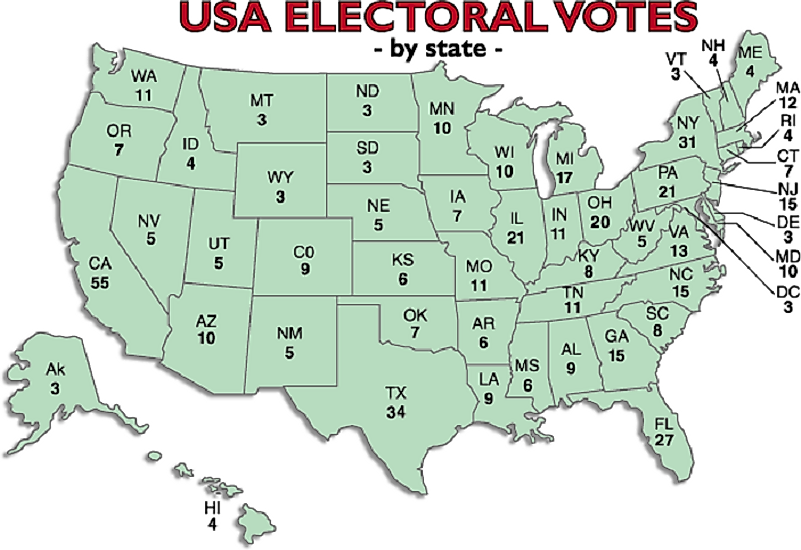Could A Candidate Lose The Popular Vote By A Landslide And Still Become President?

By receiving a slight majority in all of the 11 most populous U.S. states, a presidential candidate could take office without receiving any popular votes at all in any of the other 39 states or the District of Columbia. The term of a US President lasts four years. However, contrary to the voting procedure in most democracies, US Presidents are not directly elected by the citizens. Instead, the presidency is determined by the Electoral College. This body comprises electors, who are chosen by US voters. Each state has its given number of electors, with the size of a state’s population determining how many electors it receives. Each state’s electors are equal in number to its Congressmen. In total, there are 538 electors in the College. To get an absolute majority, a requirement to win, a candidate must garner at least 270 of these electoral votes.
How It Works
With the exceptions of Nebraska and Maine, all states of the US choose their electors on the basis of a “winner-take-all” model. The state pledges all its electoral votes to the candidate who receives majority votes from voters within it. This system has been in place since the 1880s. Though federal law does not compel electors to honor their pledges, cases of electors not doing so are rare.
Popular Vote vs. Electoral Vote
It is possible for a candidate to lose the popular vote by a landslide but still win the election. The popular vote is an aggregate of all voters from all US states. A candidate, who does not garner the majority of the popular vote, but wins in the Electoral College, becomes the President-Elect. This has happened three times, including the 2000 election contest between Al Gore and George W. Bush.
Historical Precedence
There is a historical precedence of this phenomenon of "losing yet winning", at least to some degree, with the first instance being Rutherford B. Hayes’ 1876 win. The other two cases were Benjamin Harrison’s win in 1888 and George W. Bush in 2000. In these three elections, however, neither Hayes, Harrison, nor Bush were outvoted by landslide margins in the popular vote, these three elections all being quite close.
What Happens If No Candidate Receives a Majority?
The winning candidate must receive at least 270 of the 538 available votes as the numbers stand today. If none of the candidates gets an absolute majority, the Twelfth Amendment provides that the decision is transferred to the House of Representatives, the lower chamber of the U.S. Congress, where the policy is one vote for each state delegation. If no candidate gets a majority for the Vice Presidency, the decision is passed on to the Senate, and each Senator has one vote. A historical precedence of this was in 1824 when neither Andrew Jackson nor John Quincy Adams had an absolute majority of Electoral College votes. As a consequence, the decision was forwarded to Congress, which selected John Quincy Adams instead of Andrew Jackson.
Crucial States Allowing For A Win Despite Losing The Popular Vote
The Electoral College system makes it possible for a candidate to win the election even in the event of his or her opponent winning the popular vote by a landslide. For this to happen, the candidate must get at least 270 votes. There are eleven important states needed to secure an Electoral College win. The states are California, which has 55 votes, Texas with 38, Florida with 29, New York with 29 votes, Illinois with 20 votes, Pennsylvania with 20 votes, Ohio with 18 votes, Georgia with 16 votes, Michigan with 16 votes, North Carolina with 15 votes, and New Jersey which has 14 votes. These add up to a total of 270 votes.
Benefits And Drawbacks Of The U.S. Electoral College System
Those who support the Electoral College system point out that, in addition to protecting the rights of smaller states, it ensures that the impact of state-level fraud remains in the state, and does not influence the nationwide election as much as it would in a direct election system. Critics, on the other hand, argue that its enabling of popular vote losers to win the election is unfair to voters.











